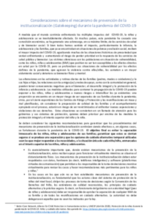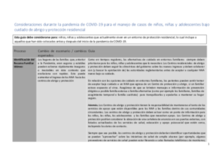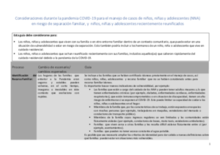This page contains documents and other resources related to children's care in the Americas. Browse resources by region, country, or category.
Displaying 891 - 900 of 3191
Unaccompanied children and young people in the U.S. who would normally have been allowed to live with relatives while they awaited decisions on their immigration cases are now being expelled from the country "under an emergency declaration citing the coronavirus pandemic, with 600 minors expelled in April alone," according to this article from the Guardian.
"As tensions and challenges from the nationwide quarantine increase, the usual channels that might pick up on abuse are not working," says this article from the Bogotá Post in Colombia.
This article from the World Economic Forum describes the impact of the COVID-19 crisis on children in immigration detention in the United States and calls on the US government to take immediate actions to stop the violence against migrant children and families and to protect them from the impacts of the COVID-19 pandemic.
Este documento presenta recomendaciones para garantizar que los procedimientos del mecanismo de prevención de la institucionalización continúen siendo efectivos o, en algunos casos, se fortalezcan durante la pandemia de la COVID-19.
Esta guía debe considerarse para: niños, niñas y adolescentes que actualmente viven en un entorno de protección residencial, lo cual incluye a aquellos que han sido colocados antes y después del inicio de la pandemia de COVID-19.
Esta guía debe considerarse para los niños, niñas y adolescentes que viven con su familia que puede estar en una situación de vulnerabilidad o estar en riesgo de separación y también los niños, niñas o adolescentes que se han reunificado recientemente con sus familias, incluidos aquellos(as) que salieron rápidamente del cuidado residencial debido a la pandemia de la COVID-19.
This study aims to describe the lived experiences of skip-generation families to better identify their needs.
This article from Slate tells the story of Salvador and Rosita, a father and daughter who were separated by U.S. Immigration and Customs Enforcement shortly after arriving in the United States.
This article argues that the current system of care in most jurisdictions forces foster youth to be financially and socially independent at an earlier age, despite insufficient preparation, and notes that healthcare providers can be important advocates for youth in care by championing their medical and psychological needs and serving as a bridge that lasts beyond foster care.
In this segment, CBS News' Jericka Duncan shares the accounts of some child welfare workers who recorded video diaries of the lengths they must go to meet with kids and families while observing health precautions.




